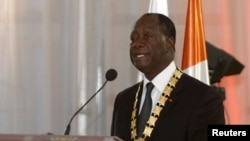Ivory Coast President Alassane Ouattara has taken a step towards drawing up a new constitution and scrapping a nationality clause which helped drag his West African nation into a decade-long crisis and bedeviled his own initial bids for the presidency.
The presidential office, in a statement late on Tuesday, announced the appointment of a 10-member experts panel, including Justice Minister Sansan Kambile along with legal experts and law professors, to draft a new national charter.
The new constitution would go to a public referendum for approval, Ouattara's office said.
Ouattara pledged during his campaign for re-election last year to scrap a nationality clause which helped lead the world's top cocoa grower and French-speaking West Africa's largest economy into prolonged crisis.
The current charter, ratified in 2000 in the wake of a military coup, states presidential candidates must prove both their parents are natural-born Ivorians. They must also have never claimed citizenship of another country.
Ivory Coast has long been a magnet for immigrants from neighboring countries and the clause became a symbol of exclusion, particularly of northerners whose family ties often cross into neighboring Burkina Faso, Mali and Guinea.
Ivorian nationality became a burning political issue at the heart of a 2002-2003 civil war that divided the country in two for eight years.
Ouattara himself was barred from seeking the presidency over what opponents said were his foreign origins before he finally won election in 2010. However, his victory sparked a second brief civil conflict that killed more than 3,000 people.
The statement said Ouattara would hold consultations with opposition figures, traditional chiefs, religious leaders and members of civil society groups.
"The results of these consultations will be transmitted to the Experts Committee with the aim of proposing to the President of the Republic a text to submit to referendum in order to give Ivory Coast a new constitution," the statement said.
Ouattara is also believed to be seeking to create the new post of vice-president to take over and complete the president's term if he were incapacitated or died in office.
Currently, the speaker of parliament is second in line to the presidency, but the constitution states that new elections must be organized within 90 days, a time frame critics say is unworkable.





